| Srl | Item |
| 1 |
ID:
099454
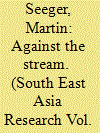

|
|
|
|
|
| Publication |
2010.
|
| Summary/Abstract |
Both Thai and Western academia have recently paid increasing attention to the changing roles of Thai Buddhist women. Still conspicuously missing, however, are more in-depth studies of female Buddhist saints in Thailand and the attendant symbolism, which would provide a more adequate depiction of the contemporary Thai Buddhist landscape. Similar to the prominent role of the mae chi in monastic education, the emergence of hagiographies and the veneration of female Buddhist saints has not, to date, been given sufficient attention in academic studies. To help remedy this situation, this paper provides a life account of one of the most outstanding female practitioners of modern Thai Buddhism: Mae Chi Kaew Sianglam (1901-1991). A summary of an increasing number of available biographical materials on Mae Chi Kaew's life is followed by a thematic analysis in which the author examines various aspects of her life accounts and her veneration. The purpose is to study the enormous significance of Mae Chi Kaew's biographies and attendant symbolic representations in the context of the religious landscape of Thai Buddhism. The author shows that many hagiographical elements in the sacred biographies of Mae Chi Kaew approximate the hagiographical paradigms not only of the Buddha and other Pali canonical figures, but also of modern saints of the Thai forest tradition. At the same time, however, significant hagiographical and venerational particularities can be observed.
|
|
|
|
|
|
|
|
|
|
|
|
|
|
|
|
| 2 |
ID:
109721


|
|
|
| 3 |
ID:
168812
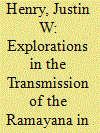

|
|
|
|
|
| Summary/Abstract |
This essay explores the identification of the island of Sri Lanka with the ‘Lankapura’ of Ramayana literary fame, tracing the transmission of the mythical geography of the epic from late medieval South India to Sri Lankan Tamil temple literature. The invading Cholas of the tenth century were the first to identify Sri Lanka as the ‘Lanka’ of the Ramayana, a geographical equivalence maintained by the Arya Cakravarti rulers who dubbed themselves ‘guardians of Rama’s bridge’ (cētu kāvalan). I highlight the uniquely sympathetic treatment of Ravana by the Hindus of eastern Sri Lanka, and explore the likelihood that Tamil impressions of Ravana impacted his appearance in Sinhala Buddhist literature from the fifteenth century onwards.
|
|
|
|
|
|
|
|
|
|
|
|
|
|
|
|
| 4 |
ID:
181272
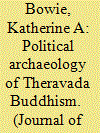

|
|
|
|
|
| Summary/Abstract |
As the central Thai government expanded into the northern region during the early decades of the twentieth century, thousands of northern monks created a movement spearheaded by the famous monk, Khruba Srivichai (1878–1939). Even after Srivichai's multiple arrests and the disrobing of some 1,000 of his disciples in 1936, tensions continued. Oral histories reveal underlying differences in religious interpretations; one was outrage at the construction of funerary chedis on temple grounds. To understand why northerners found this practice sacrilegious, this essay undertakes an ideological archaeology into the ‘space of dissension’ of differing central and northern Thai funerary practices.
|
|
|
|
|
|
|
|
|
|
|
|
|
|
|
|
| 5 |
ID:
113347
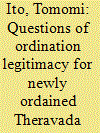

|
|
|
|
|
| Publication |
2012.
|
| Summary/Abstract |
In Thailand the widespread assumption that bhikkhuni ordination has already been disrupted and that as a result Theravada Buddhist women can no longer be ordained has been challenged by a group of women who have received the full monastic precepts from foreign sa?gha and practise Theravada Buddhism in yellow monastic robes. Public concerns have centred on whether such bhikkhuni ordinations are possible, and how women could become bhikkhuni in a 'correct' way. Both supporters and opponents are often vocal in discussing ordination ceremony procedures, based on their interpretation of the vinaya, the monastic disciplines. This paper argues that it is not a matter of 'right' procedure, but rather of the authority of the religious institution or tradition that validates one's ordination. Even if a woman is ordained as a bhikkhuni by the 'right' procedure, her status remains unstable unless the religious authority of her country sanctions her ordination. In other words, it is only a political decision made by a religious institution - in the case of Thailand, the National Sa?gha - that can reinstate 'legitimate' bhikkhuni ordination.
|
|
|
|
|
|
|
|
|
|
|
|
|
|
|
|
| 6 |
ID:
144763
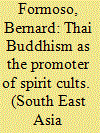

|
|
|
|
|
| Summary/Abstract |
Studies of religion in Buddhist societies of South East Asia have largely overlooked the role played by Buddhism in the growth of spirit cults. Through a comparison of Thai Buddhist and Tai pre-Buddhist conceptions of death and the afterlife, this paper shows how the theory of karmic causation introduced uncertainty about the status of rebirth and failed to erase previous conceptions about the afterlife. As a result, the belief in reincarnation coexists with the idea that the soul of the deceased may maintain an active presence among the living. Buddhism also imposed a redemption-cum-protection transactional pattern with spirits and deities, whose gradations of meaning are interpreted with reference to different variables. This pattern extends to supernatural patron–client bonds, a typical feature of the Thai social structure.
|
|
|
|
|
|
|
|
|
|
|
|
|
|
|
|
| 7 |
ID:
117060
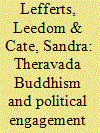

|
|
|
|
|
| Publication |
2012.
|
| Summary/Abstract |
The Thai-Lao of North East Thailand (Isan), the major ethnic group in a core area of the Red Shirt movement, have long expressed concern with the well-being of the muang - now nation-state - in which they reside. This paper explores the proposition that the moral foundations for continuing political engagement at the muang level are explicitly stated in the annual Theravada Buddhist festival, the Bun Phra Wet, celebrated in almost every Thai-Lao village. Moreover, these concerns also involve appropriate actions by the people to correct the systems in which they live.
|
|
|
|
|
|
|
|
|
|
|
|
|
|
|
|
| 8 |
ID:
091965
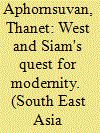

|
|
|
|
|
| Publication |
2009.
|
| Summary/Abstract |
This paper examines the interactions that occurred between Westerners and the Siamese elite in the nineteenth century. The author contends that the perceived superiority of Western science and knowledge came not as a result of its being Western as such, but rather as a consequence of the Siamese elite's secure political position in terms of its physical and intellectual powers. The adoption of Western knowledge was measured against the truth of Theravada Buddhism and Buddhist political ideas. Western knowledge and science thus provided the ruling classes with a modern perception of themselves and the world. Nevertheless, the persistence of Siamese sakdina [feudal] social relations ultimately prevented complete modernization. Modernity therefore ended up in the hands of the elite and did not extend to the wider populace.
|
|
|
|
|
|
|
|
|
|
|
|
|
|
|
|